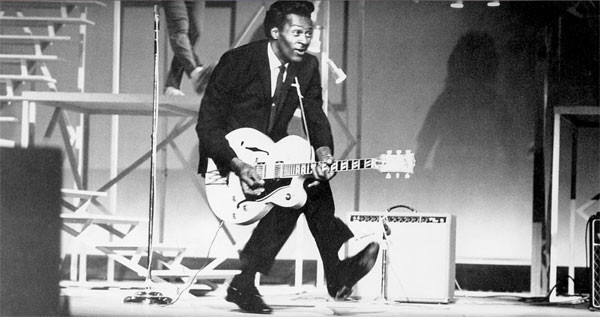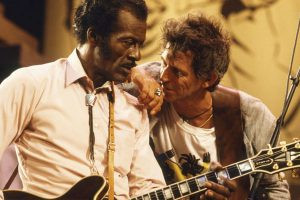Are you wondering who truly deserves the title of “King of Rock and Roll?” At rockscapes.net, we delve into the heart of this debate, exploring the musical contributions, cultural impact, and lasting legacy of both Elvis Presley and Chuck Berry to provide you with a definitive answer. Discover the titans of rock and roll and celebrate the enduring legacy of rock music and the rock and roll hall of fame with us.
1. Why Is Chuck Berry Often Considered the True King of Rock and Roll?
Chuck Berry is often considered the true King of Rock and Roll due to his profound influence on the genre’s musicality and songwriting. Unlike Elvis, who primarily interpreted songs written by others, Chuck Berry wrote over 300 songs, many of which became rock and roll standards. His compositions were covered by iconic bands such as The Rolling Stones and The Beatles, highlighting their universal appeal and impact on rock musicians. Berry’s ability to capture the essence of youth culture and translate it into catchy melodies and relatable lyrics set him apart, solidifying his status as a foundational figure in rock and roll history.
Considered the Shakespeare of Rock and Roll by Bob Dylan, Chuck Berry’s work had a profound influence on the entire rock and roll genre. Many musicians and critics argue that Chuck Berry’s songwriting prowess and instrumental skills far surpass those of Elvis Presley.
2. What Were Chuck Berry’s Key Contributions to Rock and Roll?
Chuck Berry’s key contributions to rock and roll were threefold: innovative guitar playing, poetic lyricism, and captivating stage presence.
- Guitar Playing: Berry innovated rock and roll guitar playing, creating iconic intros that are still emulated today. His rhythm guitar work, notably in “Johnny B. Goode” and “Roll Over Beethoven,” defined the genre’s sound.
- Lyricism: Berry’s lyrics captured the spirit of the times, telling stories that resonated with a generation. Songs like “Nadine” painted vivid pictures of the era, blending narrative with rhythm.
- Stage Presence: Berry’s stage showmanship was unique, featuring his signature “duckwalk” and engaging performances that connected with audiences of all ages.
3. How Did Chuck Berry Invent Rock and Roll Guitar?
Chuck Berry essentially invented how to play rock and roll guitar by combining blues riffs with country music sensibilities, creating a unique and influential style. His guitar introductions, such as the iconic opening of “Johnny B. Goode,” are instantly recognizable and have been studied by guitarists for decades. Berry’s innovative use of the guitar as a lead instrument, coupled with his energetic stage presence, helped define the sound and attitude of rock and roll. According to Ted Nugent, if you don’t know every Chuck Berry lick, you can’t play rock guitar, highlighting Berry’s pivotal role in shaping rock guitar playing.
 Chuck Berry playing guitar doing his famous duck walk, his style of play is studied by rock and roll guitarist to this day
Chuck Berry playing guitar doing his famous duck walk, his style of play is studied by rock and roll guitarist to this day
4. What Made Chuck Berry’s Lyrics So Unique and Influential?
Chuck Berry’s lyrics were unique and influential because they spoke directly to the experiences and aspirations of the youth in the 1950s and 1960s. His songs explored themes of cars, school, and teenage romance with wit and relatability, capturing the essence of the era. Berry’s ability to tell stories through his music, combined with his clever wordplay and catchy hooks, made his lyrics resonate with audiences and cemented his place as a masterful songwriter. His narratives often reflected the everyday lives and dreams of young people, making him a voice for a generation.
5. Can You Explain Chuck Berry’s Stage Showmanship and Its Impact?
Chuck Berry’s stage showmanship was a critical element of his appeal and impact. He had a charismatic presence, often sporting a wry smile that suggested he was in on a joke the audience wasn’t. His clear enunciation and engaging eye contact connected him with listeners, making them feel like he was singing directly to them. Berry’s signature “duckwalk,” a physical embodiment of his playful spirit, became his trademark move. These elements, combined with his energetic guitar playing, created a dynamic and memorable performance that solidified his reputation as a top entertainer.
6. What Was the Significance of Chess Records in Chuck Berry’s Career?
Chess Records played a pivotal role in Chuck Berry’s career by providing him with a platform to record and release his groundbreaking music. The label’s house band, led by Willie Dixon, provided the perfect backing for Berry’s songs, helping to create the signature Chess Records sound. Chess Records’ support allowed Berry to experiment and refine his sound, ultimately leading to the creation of many of his most iconic hits.
7. How Did Racism Affect Chuck Berry’s Career and Recognition?
Racism significantly impacted Chuck Berry’s career, limiting his commercial success despite his immense talent and influence. In the 1950s, racial prejudice in the music industry meant that black artists like Berry often faced discrimination in radio airplay, record sales, and overall recognition. As Renée Graham of the Boston Globe noted, artists like Elvis Presley and Pat Boone, who were white, often outsold Berry, even when covering his songs. This systemic racism likely contributed to Berry’s feeling of being underappreciated and may have influenced his sometimes difficult personality.
8. In What Ways Did Elvis Presley Contribute to Rock and Roll?
Elvis Presley contributed significantly to rock and roll by popularizing the genre and bringing it to a mainstream audience. With his charismatic stage presence, distinctive voice, and rebellious image, Elvis captivated audiences and helped break down racial barriers in music. Although he didn’t write many of his own songs, Elvis’s interpretations and performances infused them with a unique energy and passion that resonated with listeners. His impact on music and popular culture is undeniable, making him one of the most iconic figures in rock and roll history.
9. What Was Elvis Presley’s Musical Style and How Did It Evolve?
Elvis Presley’s musical style was a blend of country, blues, and gospel, creating a sound that was both familiar and revolutionary. Initially, his music was raw and energetic, characterized by his dynamic vocals and suggestive stage movements. As his career progressed, Elvis’s style became more polished and pop-oriented, incorporating elements of balladry and orchestral arrangements. This evolution allowed him to appeal to a broader audience, but also led to debates about the authenticity of his later work compared to his earlier, more rebellious sound.
10. Who Were Some Other Influential Figures in Early Rock and Roll?
Besides Chuck Berry and Elvis Presley, other influential figures in early rock and roll include:
- Little Richard: Known for his flamboyant performances and energetic piano playing.
- Fats Domino: A New Orleans pianist with a smooth, boogie-woogie style.
- Jerry Lee Lewis: A wild piano player with a rebellious spirit.
- Buddy Holly: A singer-songwriter who brought a clean-cut image and innovative song structures to rock and roll.
- Sister Rosetta Tharpe: A gospel singer and guitarist who influenced many early rock and roll musicians.
These artists, along with countless others, helped shape the sound and culture of early rock and roll, paving the way for future generations of musicians.
11. What Is the Ongoing Debate About the King of Rock and Roll?
The ongoing debate about who is the King of Rock and Roll centers on differing interpretations of what qualities define a true innovator and leader in the genre. Proponents of Elvis Presley often highlight his unprecedented popularity and cultural impact, arguing that he brought rock and roll to a mass audience and challenged societal norms. On the other hand, those who champion Chuck Berry emphasize his songwriting prowess, instrumental skills, and lyrical genius, asserting that he laid the foundation for rock and roll as a distinct musical form. Ultimately, the debate reflects the complex and multifaceted nature of rock and roll history.
12. How Did Chuck Berry’s Upbringing Influence His Music?
Chuck Berry’s middle-class upbringing in St. Louis, Missouri, provided him with a unique perspective that influenced his music. Unlike many of his blues contemporaries who came from impoverished backgrounds, Berry had access to education and cultural opportunities that shaped his worldview. His exposure to diverse musical styles, from blues to country to pop, informed his eclectic approach to songwriting and guitar playing. Berry’s lyrics often reflected the aspirations and experiences of middle-class youth, making his music relatable to a broad audience.
13. Why Did Chuck Berry Face Legal Troubles Throughout His Career?
Chuck Berry faced multiple legal troubles throughout his career, ranging from minor offenses to more serious charges. Some of these issues stemmed from his business dealings, while others involved personal conduct. These legal problems often overshadowed his musical achievements and contributed to a perception of him as a controversial figure. Despite these challenges, Berry remained a prolific performer and songwriter, leaving a lasting impact on rock and roll history.
14. What Is the Significance of Keith Richards’ Involvement With Chuck Berry?
Keith Richards’ involvement with Chuck Berry is significant because it highlights the deep respect and admiration that many rock musicians have for Berry’s work. Richards, the guitarist for The Rolling Stones, has often cited Berry as a major influence on his playing and songwriting. He organized Berry’s 60th Birthday Party, which was filmed for the documentary “Hail, Hail, Rock and Roll,” showcasing Berry’s music and legacy. Despite some tensions during the production, Richards’ dedication to honoring Berry’s contributions underscores the importance of Berry’s music to the rock and roll community.
 Keith Richards with Chuck Berry, hail hail rock and roll concert, shows respect for Chuck Berry legacy
Keith Richards with Chuck Berry, hail hail rock and roll concert, shows respect for Chuck Berry legacy
15. What Are Some Lesser-Known Chuck Berry Songs Worth Exploring?
While songs like “Johnny B. Goode” and “Roll Over Beethoven” are Chuck Berry’s most famous hits, his catalog includes many lesser-known gems worth exploring:
- “No Particular Place to Go”
- “You Never Can Tell”
- “Havana Moon”
- “Almost Grown”
- “Rock and Roll Music”
- “No Money Down”
- “Brown Eyed Handsome Man”
- “Too Much Monkey Business”
- “Reelin’ and Rockin'”
These songs showcase Berry’s versatility as a songwriter and performer, offering a deeper understanding of his musical genius.
16. What Aspects Defined the King of Rock and Roll in the 1950s?
In the 1950s, the King of Rock and Roll was defined by a combination of musical innovation, cultural impact, and commercial success. Artists who challenged societal norms, pushed musical boundaries, and captured the spirit of the times were considered leaders in the genre. The King also had to possess charisma, stage presence, and the ability to connect with audiences on a personal level. The decade was a turning point that helped define the direction of rock and roll.
17. How Do Contemporary Artists View Chuck Berry’s Influence on Music?
Contemporary artists widely acknowledge Chuck Berry’s profound influence on music. Many musicians cite Berry as a major inspiration, praising his songwriting, guitar playing, and stage presence. His songs continue to be covered and celebrated by artists across genres, demonstrating the enduring relevance of his music. Contemporary artists recognize Berry as a foundational figure in rock and roll, whose contributions helped shape the sound and culture of popular music.
18. What Were Some of the Key Musical Elements That Chuck Berry Popularized?
Chuck Berry popularized several key musical elements that became hallmarks of rock and roll:
- The use of the electric guitar as a lead instrument: Berry’s guitar riffs and solos were central to his sound.
- A driving rhythm: His songs featured a strong, danceable beat.
- Storytelling lyrics: Berry’s songs told relatable stories about teenage life and aspirations.
- A blend of blues, country, and pop influences: Berry combined these genres to create a unique sound.
These elements, combined with Berry’s energetic performances, helped define the sound of rock and roll and influenced countless musicians.
19. How Did Elvis Integrate Rock and Roll Into Mainstream Culture?
Elvis integrated rock and roll into mainstream culture by combining it with his charisma, good looks, and suggestive dance moves, which challenged the social norms of the 1950s. His performances on national television and in movies brought rock and roll to a wider audience, breaking down racial barriers and generational divides. Elvis’s music and image resonated with young people, who embraced him as a symbol of rebellion and freedom. By popularizing rock and roll, Elvis helped pave the way for future generations of musicians and transformed popular culture.
20. How Can Rockscapes.net Help You Enhance Your Landscape With Rock and Roll Inspired Designs?
Rockscapes.net offers a variety of services to help you enhance your landscape with rock and roll-inspired designs. Whether you’re looking to create a rock garden that pays homage to your favorite musicians or incorporate stone features that evoke the energy and spirit of rock and roll, we can help. Our team of experts can provide you with design ideas, material selection assistance, and installation services to bring your vision to life.
At rockscapes.net, we understand that creating a landscape is a unique challenge. That’s why we’re here to help you find the perfect design for your home. Whether you’re looking for design ideas or material selection assistance, our team of experts is here to assist. Contact us today at 1151 S Forest Ave, Tempe, AZ 85281, United States, or call us at +1 (480) 965-9011. Visit our website at rockscapes.net to discover how we can transform your outdoor space into a rock and roll paradise.
